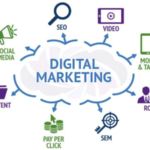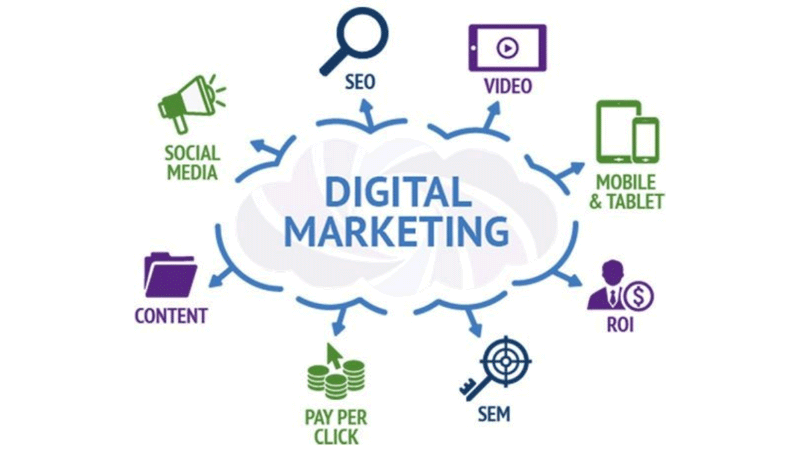
WHAT IS DIGITAL MARKETING ?
Digital marketing is the use of websites, apps, mobile devices, social media, search engines, and other digital means to promote and sell products and services.
Digital marketing involves many of the same principles as traditional marketing and is often considered an additional way for companies to approach consumers and understand their behavior. Companies often combine traditional and digital marketing techniques in their strategies. But digital marketing also comes with its own set of challenges. Digital marketing started to become popular with the widespread adoption of the internet in the 1990s.
WHY DIGITAL MARKETING IS IMPORTANT
To succeed, businesses must find effective ways to spread the word about their products and services and that’s never been more challenging than today. Consumers face more choices from more providers, all clamoring for their attention. Deploying compelling content on digital marketing platforms is one way to stand out from the crowd.
Another reason digital marketing is so important to businesses is simply this: it’s where your ideal customer is hanging out. According to the research experts at Statista, as of 2023, there are 5.19 billion internet users and 4.88 social media users worldwide. On average, internet users spend six hours and 40 minutes online every day.
This enormous, highly engaged online audience presents tremendous opportunities for businesses that want to gain visibility for their goods and services. Digital marketing offers near-endless opportunities for connecting with potential customers and is a vital component of nearly every business’s marketing mix.
BENEFITS OF DIGITAL MARKETING
There are several key advantages of using digital marketing. Here are the top benefits:
- Budget-friendly: You can engage in some forms of digital marketing, such as email and social media, with little to no money.
- Measurable results: Most forms of digital marketing allow you to measure key performance metrics, including total number of impressions, CTRs, cost per conversion, overall conversion rates and more.
- Improved brand awareness: With so many people using digital devices to access social channels, texts and emails, you have near-unlimited potential to generate awareness for your brand and products.
- Strong engagement: Digital marketing lets you create compelling content via text, images and video, leading to strong customer engagement.
- Strong ROI potential: Digital marketing often earns a more substantial ROI than traditional marketing and advertising tactics.
- Global and regional reach: Depending on the digital marketing tactics you choose, you can limit your reach to a local or regional
- or use digital channels, such as YouTube and TikTok, where your content can reach a global audience.
- Flexibility: You can change or adopt new digital marketing strategies relatively quickly.
TYPES OF DIGITAL MARKETING
Digital marketing applies to all industries and business types but requires a tailored approach to be effective. As such, digital marketing can appear in many forms, including the following:
- Email marketing. Organizations reach out to customers and prospects through email to promote current business practices such as sales or events.
- Social media marketing. Organizations use social media marketing through social networks and platforms, including Facebook, X, LinkedIn and Pinterest to connect and communicate with customers and prospective customers, notifying them of updates or deals, as well as just communicating and building social trust.
- Pay-per-click (PPC) advertising. PPC advertising lets organizations advertise on different websites with paid ads. An example of such an advertisement is a banner ad. If enough data or cookies are collected about a user, these ads can be targeted by characteristics such as age, gender, location or general interests. The ad publisher is paid every time a user clicks on the ad.
- Content marketing. This digital marketing strategy tries to reach customers through content. Content refers to something an organization produces and publishes on a website with the intent to promote it through other marketing types, such as social media or email.
- Sponsored content. An organization pays another business to create and promote content that highlights the marketer’s product or service.
- Affiliate marketing. An organization pays a commission to an influencer on a specific platform, such as YouTube or Instagram, to promote its product or service.
- Short Message Service (SMS) marketing. Organizations might choose to use SMS messages to send promotions to customer. Political candidates running for office commonly send SMS messages as a part of their campaigning efforts.
- Video marketing. Video marketing involves using video content to promote products, services or brands across digital channels. It can be used across different platforms including social media sites such as YouTube, Facebook, Instagram and TikTok, as well as on company websites. Video marketing can also take the form of product demonstrations, customer testimonials or live-streaming events. It can engage viewers, raise brand awareness and drive conversions by using appealing visuals and storytelling.
- Marketing automation. Marketing automation software has also become increasingly important to digital marketing, as companies try to reach a broader swath of potential customers and link customer behavior with potential new purchases. For example, organizations use marketing automation to measure visitor behavior on their websites, and then target visitors to potentially sell products and services.
DIGITAL MARKETER ROLES AND THE KPIs THEY MEASURE
Digital marketing encompasses a wide range of roles and responsibilities. Some common digital marketing roles and the KPIs they measure include the following:
SEO specialist
An SEO specialist focuses on optimizing websites and content to improve search engine rankings. To increase organic traffic, they conduct keyword research, build backlinks, optimize on-page elements and analyze website performance.
KPIs measured include the following:
- Organic traffic.
- Keyword rankings.
- Backlinks.
- Click-through rate (CTR) from search results.
- Bounce rate and time on page.
Content marketing specialist
A content marketing specialist is responsible for producing and overseeing content for numerous digital platforms. They plan content strategy, manage content production, ensure brand coherence and assess content effectiveness.
KPIs measured include the following:
- Website traffic.
- Time on page.
- Conversion rate.
- Bounce rate.
- Lead generation from content.
Social media manager
A social media manager manages and executes social media strategies across various platforms. They produce and curate content, interact with viewers, perform sentiment analysis, track social media data and optimize social media strategies.
KPIs measured include the following:
- Follower growth.
- Reach.
- CTR.
- Engagement rate.
- Sentiment analysis.
- Conversions from social media.
Email marketing specialist
An email marketing specialist creates and executes email marketing campaigns. They also create email templates, divide the audience into groups, evaluate the success of digital marketing campaigns and generate compelling email content.
KPIs measured include the following:
- Open rate.
- CTR.
- Conversion rate.
- Unsubscribe rate.
- Revenue generated from email campaigns.
Copywriter
A copywriter generates persuasive and engaging writing for digital marketing efforts. They produce engaging content for websites, advertisements, emails, postings on social media and other marketing materials.
KPIs measured include the following:
- Number of content pieces written in a specific time frame.
- Sales revenue.
- Conversion rates.
- CTR.
- Social media shares.
- Brand consistency.
Digital marketing project manager
Digital marketing project managers are responsible for overseeing the entirety of marketing initiatives. They streamline an organization’s marketing workflows, procedures and systems using project management tools and techniques.
KPIs measured include the following:
- Overall campaign performance.
- Return on investment.
- Cost per lead.
- Project timeline adherence.
- Customer acquisition cost.

Leave a Reply